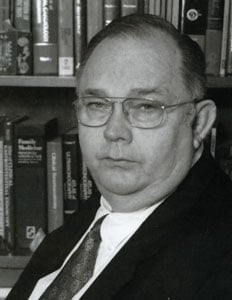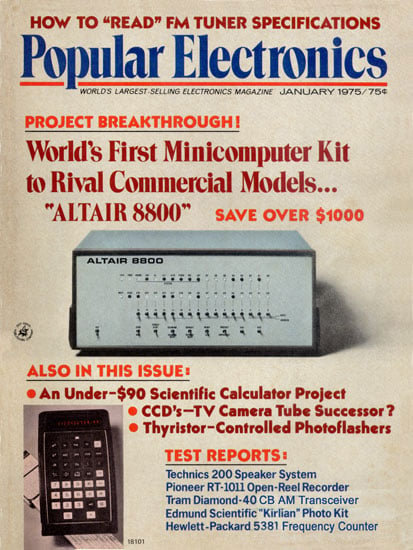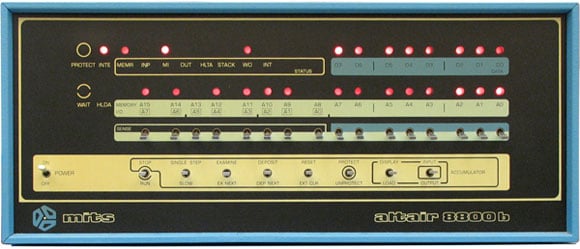
Spencer Smith, CC BY 3.0, via Wikimedia Commons
4 Facts About The MITS Altair 8800
- The MITS Altair 8800 was the first customizable microcomputer. It can be thought of as the predecessor to the Arduino and Raspberry Pi microcomputers.
- The Altair 8800’s initial team of creators consisted almost entirely of United States Air Force veterans, many of whom were still serving when MITS was founded.
- Many of the accessories for the MITS Altair 8800 were actually created by people who got tired of waiting for backordered parts. The demand for Altair accessories was greater than their manufacturing and delivering capabilities, so competitors saw an opportunity.
- Bill Gates contacted the owner of MITS and asked to write BASIC programming language for the kit.

January 1975 cover of the magazine Popular Electronics, featuring the Altair 8800
The History Of The MITS Altair 8800: What To Know
The MITS Altair 8800 is credited with having popularized microcomputers. This microcomputer was the first practical “build it yourself” computer kit available to hobbyists. This microcomputer kit was created by MITS, which stands for Micro Instrumentation and Telemetry Systems, which was founded in New Mexico in 1969, by United States Air Force veterans Ed Roberts and Robert Mims.
Quick Facts
- Original price
- Unassembled: $439 ($2,100 today when accounting for inflation) Assembled: $621 ($3,000 today when accounting for inflation)
The two founders were fond of model rockets earlier in their careers and even met with the publisher of the Model Rocketry magazine. Forrest Mims wrote an article for Model Rocketry about a tracking light used to track rockets launched during his time in the Vietnam War the same year he and Ed Roberts founded MITS, and eventually became a recurring contributor to the magazine.
It was then the two brought in fellow United States Air Force veterans Stan Cagle and Bob Zaller to begin developing and selling model rocket accessory kits and made a press release in the Model Rocketry magazine to announce their company’s new beginning. The early days of the company saw the sales of accessories that could tell model rocket hobbyists surrounding temperature, roll rates, and other telemetric measurements about their rockets.
However, it did not take long for the company’s next big idea to come: the Opticom, which was a light-emitting diode (LED) capable of transmitting audio through concentrated light waves. However it didn’t take long for many of the co-founders to want out of the company, so Ed Roberts bought the company entirely and began MITS’ next project.
In 1971, with financial backing from two more United States Air Force members, Ed Roberts released the MITS 816, a “build it yourself” four-function calculator kit. The kit did sell with the option to come assembled, though. The calculator kit did much better than the model rocket accessories, and the company was soon taking full-page advertisements in publications such as Scientific American and Popular Electronics. Just a year later a newer, more capable calculator was being sold.
In 1974 MITS finally released the predecessor to the Altair 8800 computer kit. The system’s specs included a 1024-byte memory board. Right around the time of its release the BASIC (Beginner’s All-purpose Symbolic Instruction Code) programming language was announced, as well as the Intel CPU. Just a short while later in January of 1975 Popular Electronics debuted the MITS Altair 8800 as the “world’s first minicomputer kit to rival commercial models”.
This debut was noticed by the well-known founder of Microsoft, Bill Gates, who actually contacted Ed Roberts with a proposal to create a BASIC interpreter for the MITS Altair 8800. Bill Gates would go on to work for the company part-time after leaving Harvard but ultimately left to start Microsoft.
There was little competition to the microcomputer for several months after its initial release, and the first major competitor was only releasing computer bus parts compatible with the MITS Altair 8800, but not an entire minicomputer. It wasn’t until October of 1975 that a company called IMS Associates began releasing the IMSAI 8080 kit, though MITS responded with an improved kit of their own in the Summer of 1976. In 1977 MITS was acquired by Pertec Computer Corporation.

MITS Altair 8800 Versions
The MITS Altair 8800 was a relatively customizable piece of equipment. Users needed to purchase a few components just to make it run, and there were additional accessories available. The computer itself ran anywhere from $439 to $621 depending on whether it was assembled, there were additional memory boards available for purchase, and interface boards.
There were also audio cassette boards and additional accessories made for the Altair 8800, as well as other accessories made by various companies. The main “standard” two versions in the MITS Altair 8800 microcomputer kit are the 4K BASIC and 8K BASIC packages, which shipped with either one or two 4096-word memory boards.

The image featured at the top of this post is ©Spencer Smith, CC BY 3.0, via Wikimedia Commons.
